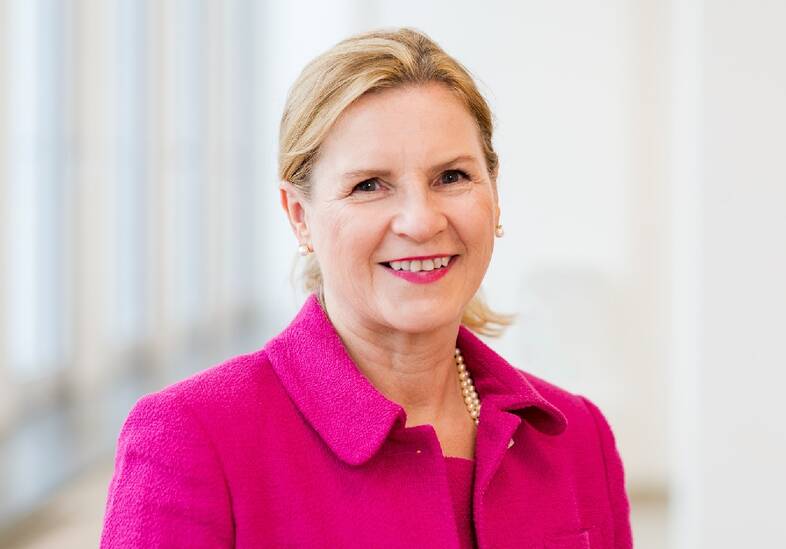Interview | Astrid Lurati, Chief Financial and Infrastructure Officer of Charité

It is undisputed that Charité enjoys an excellent international reputation for its expertise in teaching, research and medical care. For example, it has been ranked 7th among the best hospitals in the world by US magazine Newsweek in 2025. A recently published study, commissioned by Charité and conducted by DIW Econ, a subsidiary of the German Institute for Economic Research (DIW Berlin), is now highlighting the institution’s economic importance as well. We spoke about the study and its findings with Astrid Lurati, Charité’s Chief Financial and Infrastructure Officer.
1. How did the study on the economic importance of Charité come about?
By the end of last year, it became obvious that the federal state of Berlin would like to further reduce its subsidies. Charité had already received fewer subsidies than needed for investments into the maintenance, renewal and creation of infrastructure in 2023 and 2024 – and this trend could continue in the years to come. In addition, the state subsidy for research and teaching is also structurally reduced from 2025. For this reason, we have commissioned an independent examination on the extent to which money invested by the Senate in the Charité generates real added value for the state of Berlin and beyond. The results of the study should provide a basis for future decisions on the allocation of financial resources by the state in favor of the Charité. At the same time, the study can also help to obtain the respective investment approvals with regard to alternative financing models that have to be implemented in the absence of sufficient funding to finance necessary infrastructure measures.
2. Which of the study’s results surprised you the most?
The results in terms of the quality of medical care and research met our expectations. This also applies to the fact that the funding provided by the federal state generates considerable economic benefits for Berlin. What was surprising, however, was the amount of gross value added for every euro invested from state funds. This is an approximate factor of four, i.e. for every euro that the state invests in Charité, it receives four in return. Nationwide, the factor even amounts to six. Another surprise was the economic benefit through the transfer of knowledge created by Charité’s work in research and the training of specialists as well as spin-off companies. In 2023, EUR 668 million were generated by this in Berlin, roughly 0.4 per cent of the city’s total economic performance. This encourages us to place an even stronger focus on spin-offs in the future.
3. What do the results mean for the Healthcare Industries Cluster?
Once again, the results underline that Charité is a strong institution, representing an important factor for the region and beyond on many levels. For the cluster, I believe this means that we must continue to expand networks and stay more involved, not only when it comes to initiating cooperation between business and research, for example, but also shaping and continuously developing it further. In this respect, efforts sometimes do not go beyond declarations of intent. The study also highlights the significance of the entire healthcare industry for the Berlin-Brandenburg region. With this background, it could make sense to try and solicit more commitment from the private sector.
4. We, the HealthCapital cluster management, provide support at the interface between science and industry. Where can we strengthen our work?
The existing support already works very well. To strengthen it further, I see one potential approach in identifying more specific topics that can be worked on in a focused manner. To do this, relevant stakeholders must be identified and brought together. It would also make sense to expand the search for cooperation partners to include players from other federal states.
Further information:
- Article on a DIW Econ Study on Charité‘s contribution to the regional and national economy
- Study by DIW Econ
- DIW Econ on the study
- Newsweek hospital ranking
Personal details:
Astrid Lurati has been a member of the Executive Board of Charité Universitätsmedizin Berlin since May 2016. She initially served as Hospital Business Director and, since 2020, she has been responsible for Charités overall economic management as Chief Financial and Infrastructure Officer. In this role, she is in charge of economic, financial and investment planning as well as the consolidation of annual financial statements for all of Charité’s economic sub-divisions. She is also responsible for group-wide infrastructure maintenance and development, including all major construction measures, real estate matters and sustainability. She is Chairwoman of the Supervisory Board of the group holdings Charité Facility Management and Labor Berlin Gesellschaften. Astrid Lurati holds a Diplom degree in Business Administration from Hamburg University and a Master‘s degree in Pharmaceutical Medicine from the University of Witten-Herdecke.



